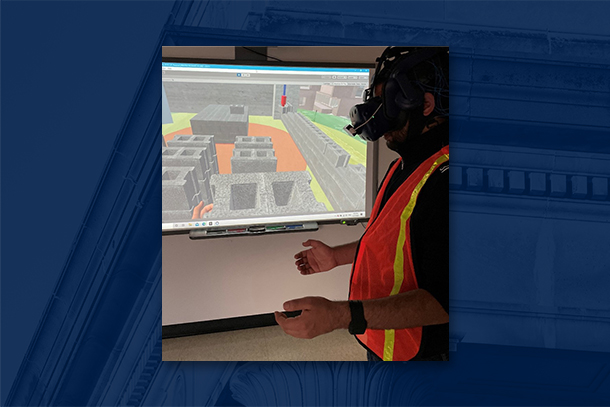
The human-centric VR-based learning module, developed by Houtan Jebelli, assistant professor of architectural engineering and principal investigator, and graduate student Shayan Shayesteh, as a preliminary work to show the feasibility of teaching students how to interact with construction robots on the job site using immersive learning environments. Credit: Houtan Jebelli/Penn State
NSF grant funds the development of construction robotics training
March 17, 2023
By Lauren Colvin
UNIVERSITY PARK, Pa. — As the use of robots in the construction industry becomes more common, there is a need for those working or who plan to work in the industry — including students in the Penn State Construction Engineering and Management (CEM) program — to be well-versed in highly technical work environments. Houtan Jebelli, assistant professor of architectural engineering and director of the Robotic, Automation, and Intelligent Sensing (RAISe) Lab at Penn State, plans to make sure that all Penn State CEM students are equipped with the competencies required for working alongside construction robots.
With a three-year, $600,000 National Science Foundation grant, Jebelli will lead a team of researchers to develop a personalized training environment for working with robots in the construction industry. The team will investigate an immersive virtual reality (VR)-based learning environment to cultivate the hands-on skills students and engineering professionals need to meet industry needs and safely interact with construction robotics throughout the construction process.
According to Jebelli, the current construction curricula rely on passive instructional methods such as lectures and presentations that translate to reduced skill retention because they lack experiential learning. In-person training is also not feasible due to safety concerns and excessive cost requirements.
Using VR technology, the research team intends to provide trainees with a hands-on, immersive and personalized learning experience that allows for a stronger connection with the learning content. With these advantages, VR-based learning provides a valuable learning alternative for students and institutions with limited or no access to physical construction robots. Jebelli said that the research has the potential to help us understand how to bridge the gap between the construction industry and CEM education using emerging educational tools.
“The immersive learning environment will help CEM students develop different skills to work with construction robots, including control, positioning and safety precautions,” Jebelli said. “We will do extensive research to make sure this learning environment is effective in helping CEM students learn and develop their skills.”
The co-principal investigators on the grant are Scarlett Miller, professor of engineering design, of mechanical engineering and of industrial and manufacturing engineering at Penn State who is also affiliated with the College of Medicine and is the director of the Center for Research in Design and Innovation; Priya Sharma, associate professor of education in the College of Education at Penn State; and Abiola Akanmu, associate professor of construction at Virginia Tech.



